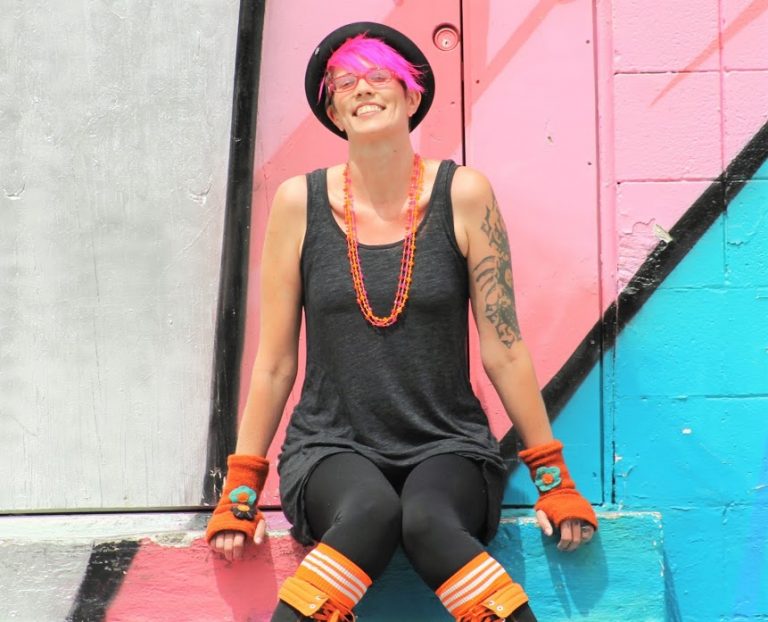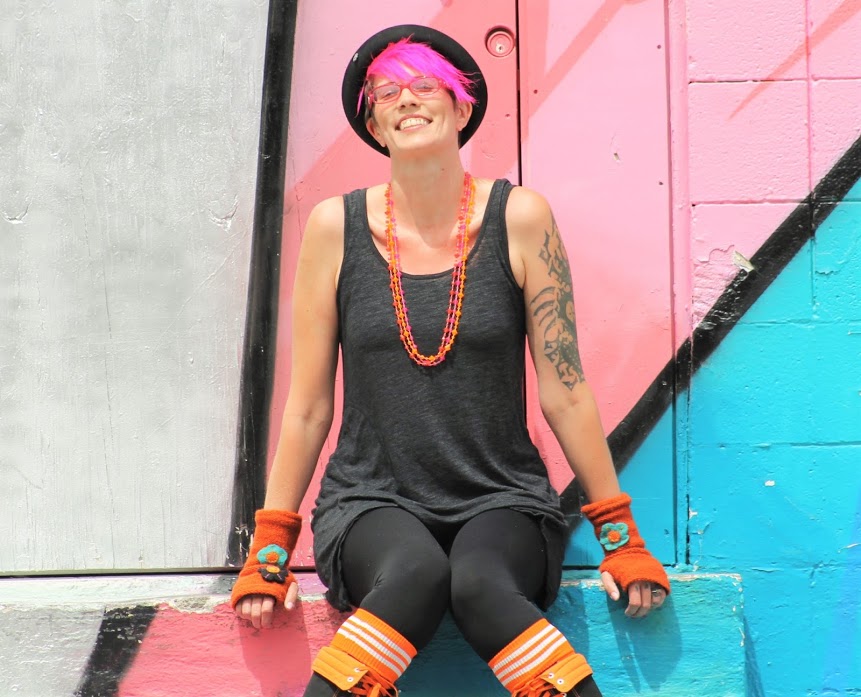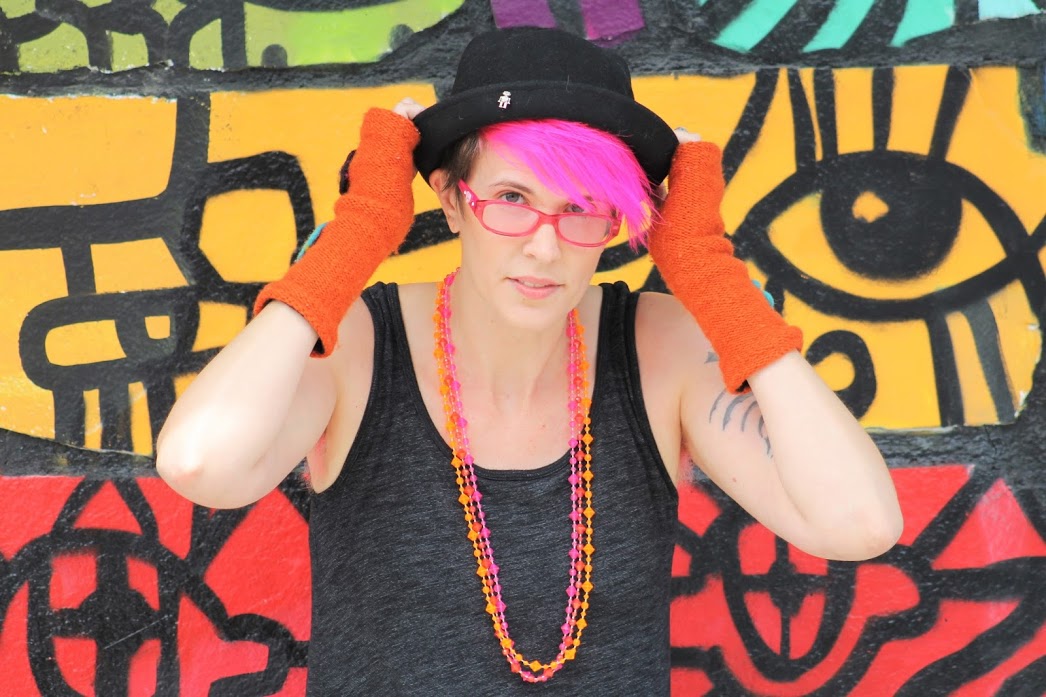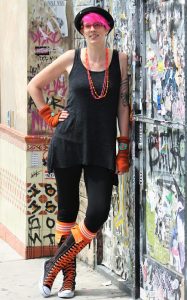The Third Degree • Featuring Kristy Meade

The Third Degree • Featuring Kristy Meade
Speaker Christina Aldan .
This article originally appeared in DT Zen magazine. Photos by Niko Christian.
Meet Kristy Meade, former information security analyst and Splunk app developer at Zappos.com. Kristy’s passion is the psychological needs of people in the workplace, specifically their need to be seen and accepted as unique individuals. Encouraging people to talk about their unconscious biases, she travels the world sharing her experiences working for her own company, Changing Stuff, and her knowledge of the ways to make a major organizational change. She is determined to create a better world by creating a better workplace.
Q. When did you learn you were a speaker?
It was actually a very precise moment. I had been asked to speak about my experiences at a Zappos All Hands meeting and there were more than 1,500 people there. I wasn’t sure I could do it, but I knew I needed to know if I could. I was nervous, shaking, sweating and doing everything I could not to look at the audience because I just knew if I looked at them I would pass out or something. Then I looked into the crowd. That’s when I saw their faces and thought, Hey, that’s Sheena right there. This is really important. She totally needs to hear about this. And at that moment my fear became irrelevant. The moment the message became more important than my speaking is the moment I became a speaker.
Q. What unexpected challenges have you faced in branching out on your own?
I didn’t realize the intensity of the imposter syndrome that would take over. I felt intensely out of place, like I had snuck into some fancy club where I clearly didn’t belong. Every time I spoke to someone about what I was doing, I felt like I was tricking them into believing that I have a right to be doing it. I even wasted thousands of dollars on classes for my certified diversity professional credentials because I thought if I had a certification then maybe it would earn me a pass into this unfamiliar world. To this day I still have part of me that feels out of place.
Q. What is the definition of “disruptive communication”?
Disruptive communication is about understanding and accepting the natural functions and flaws of the human mind. It’s about creating a safer space to allow ourselves to be vulnerable and open with one another and helps us identify when we might be under the influence of unconscious expectations. It’s integrated with powerful conflict management techniques so we do more than just learn how to surface issues, but also how to resolve them independently.
Q. Why did you choose the topic of disruptive communication to speak on?
I’ve been told all my life that I needed to be different than I am to succeed—less direct, more professional, less unique. Throughout my life it’s the same message: don’t be yourself. We each deserve the right to be ourselves, without other people policing who we are, in life and in business. And until everyone not only accepts those around them, but encourages them to be their whole selves, I’m going to keep talking.
Exclusive Web Content »
Q. Name a time when you were able to diffuse a situation by practicing disruptive communication.
That would be about every time my fiancé and I have a misunderstanding. The heart of the conflict management side of disruptive communication is in acknowledgement. We don’t have to agree with or even understand another person’s perspective to acknowledge it. When situations are escalating, it’s often because one or all parties aren’t feeling as though they’re being heard. We often assume that others want us to agree with them, but usually they just want us to listen without dismissing their experiences.
Q. Why does diversity matter?
We miss out on so much of one another when we allow social pressures to influence people to fit into a stereotype of what’s normal, beautiful, best, professional. We can never unleash our full potential as an organization or as a society without being relational. When we feel safe to bring our whole selves forward we can begin to find the innovative ways we can connect with one another, allowing our relationships to form organically and discover what we become capable of when we work together.
Q. What is the solution to increasing diversity awareness within our own circle of friends?
Short answer: speak up. We all have a tendency to stay quiet when our friends do something harmful, to tell ourselves that they didn’t really mean it or that they’re just joking. But when we don’t speak up, we’re communicating that we approve of their behavior, of their racist jokes, of their sexist comments, whatever. And if we speak from a place of privilege about an oppression that doesn’t affect us directly, our voice becomes even more powerful.
Q. What tips and tools do you have for people in the workplace who may be on the receiving end of unconscious bias?
Accept that it’s not going to be easy. It takes a lot of patience and forgiveness to help someone else grow. But also accept that you have a right to feel and be safe. If you want to help someone grow approach them with genuine curiosity and a belief that they’re acting out of ignorance instead of malice. Most people are well intentioned, despite what the media would have us believe. Take the time to truly try to understand them.
Exclusive Web Content »
Q. How can we all become a little better at listening for unconscious bias within ourselves and how it influences our daily lives?
Check in with someone else?—the buddy system. We really suck at identifying our own biases and flaws in our processing. We simply can’t see what we can’t see, or notice that we’re ignoring something. It’s kind of like letting someone know when they have food in their teeth: most of us would rather know and be mildly embarrassed while we correct the problem than ignorant and continuing to embarrass ourselves.
Q. What’s the difference, in your experience, between how millennials and baby boomers might approach diversity?
First, I want to disclaimer that generational differences are measures of the whole. Everyone is different and unique on an individual level and there are always outliers.
We’re asking more from Boomers than we are from Gen X or Gen Y when we ask for diversity. Boomers have spent most of their lives in a highly competitive workplace because of how large the generation was. The only way to be certain to keep a job was to do more, for more hours and to be better than everyone else. Diversity is about embracing the value of perspectives and ideas other than our own to have our ideas grow together. Boomers had to have the best idea and make sure no one else got credit for it or stole it so that they could survive. This type of social pressure is extremely hard to recondition. Gen X and Gen Y grew up with completely different challenges, so it’s much easier for them to share their ideas and merge them with others.
Q. How does diversity influence inspiration and innovation at a company?
It allows us to be comfortable bringing our whole selves to work, not just what we think will be acceptable or liked or professional. All of the ideas we have can be pitched, knowing that we won’t be shunned or excluded for them. If everyone is trying to fit the same professional mold, all you get is an echo chamber. When everyone feels safe to bring their uniqueness to the office, you’ll get all sorts of new innovations.
Q. Tell us about the focus on diversity right now. What can we expect in the future?
Many classes right now focus on specific stereotypes and how to accept them. Diversity awareness as a whole does this, which in reality just trains the participants to sort other people into these broad categories and then respond accordingly, instead of viewing people as unique individuals. Studies have proven this is harmful and unsustainable in the long run, yet it’s still the corporate norm. Our workplaces could really use some disrupting right now.
Q. What kind of long-term diversity management is necessary for a company to have a healthy culture?
First of all, if you’re not completely committed to diversity, don’t even start. One of the worst things a company can do is to start teaching employees how to identify issues and then not offer the resources to resolve them. That will only create negativity, a lack of trust in the organization and the loss of talent. Every organization should be committed to diversity. If they’re not they should consider just closing up shop now.
Tweet to interact: #dtzen #ZEN3rdDegree
Visit Kristy’s website at www.kristyameade.com and connect with her on Facebook at www.facebook.com/kristyameade.
Related
Tags
- Christina Aldan
- Women in Business
- Entrepreneur
- Speaker
- Women in Tech
- Solopreneur
- Personal Growth and Development
- Entrepreninja
- Leadership
- Emotional Intelligence
- podcast
- Downtown Las Vegas
- LG Podcast Network
- Diversity and Inclusion
- Life Coach
- Social Media Marketing
- dtlv
- mentorship
- Digital Advertising
- Casablanca

